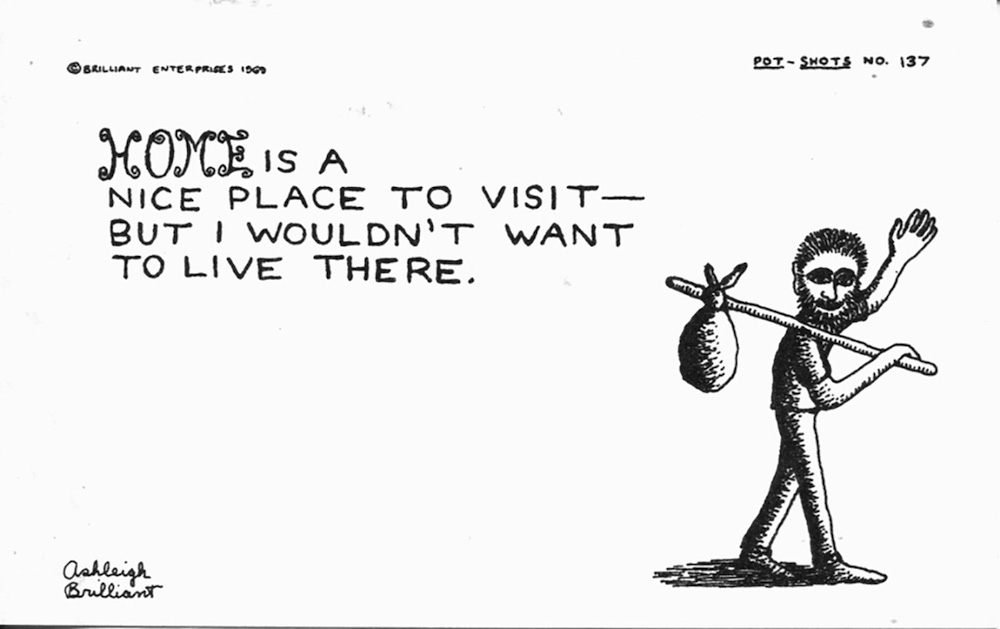Home Groan

Despite all the sentimental claptrap about “Home,” still in circulation, there are many good reasons why that word is virtually meaningless, if not actually offensive, to many people, in various situations.
I personally can remember a time (in the prosperous years after World War II, when the “American Empire” seemed to be about to replace the British), when, in different parts of the world, Americans travelling abroad were so unpopular that they were often greeted with the message, usually scrawled on some surface as graffiti, “YANKEE GO HOME!”
And even today, within our own borders, people who don’t choose to go home voluntarily can still, sometimes, as a penalty for misbehavior, be SENT Home, especially from school – or even from Summer Camp.
All this assumes that they have something called Home to go to, or to be sent to. In recent times, however, more attention has been given to those designated as “Homeless.” The official definition of that term, at least in some quarters, is “not having an address at which you can receive mail.”
One of my first published epigrams was somewhat ambivalent on this whole subject: “Home is a nice place to visit, but I wouldn’t want to live there.” But I eventually became more negative, with utterances like:
“Why do I keep coming home,
every time I try to trace my troubles to their source?”
Not that life at home with my own parents was so unbearable. I was simply too intelligent for my mother, and too rebellious for my father. And, for both of them, thanks to the government-funded British school system, I was eventually too well educated to be happy living with them.
Maybe we should be glad that there aren’t more songs about Home. There probably would be, if our language provided more words that rhyme with it. By far the most commonly used is “roam” – which at least is convenient when contrasting travel with its opposite, as in “wherever I roam, there’s no place…” But Irving Berlin managed, despite the strain, to fit “foam” into “God Bless America,” depicting a land stretching “from the mountains, to the prairies, to the oceans, white with foam.”
There are however many places called “home” where the situation makes the use of that term almost ironic, if not contradictory. Our society is dappled with “homes” for the elderly, for the handicapped, for orphans, for the mentally impaired, and many other such institutions, including, of course, homes for the homeless. Indeed, it can seem very threatening when some unfortunate person becomes aware that their own family is seriously considering putting them “into a home.”
One of our best-known folk songs, “Home on the Range,” almost makes a mockery of that whole concept. The “Home” it depicts, is populated by Buffalos, Deer, and Antelopes, who apparently wander freely, while at “play” – (with each other?) Such a land never existed, and if it did, it could certainly not have been any person’s “home.” Deer and Antelope apparently are still to be found (and hunted) in Kansas, the state in which the lyrics of this song were written (from a poem by an ear, nose, and throat doctor with the rather unmusical name of Brewster M. Higley. His own original home was in Ohio, but he had come to Kansas from Indiana, to take advantage of the “Homestead Act,” of 1862, which gave free land in the West to settlers who agreed to farm it. The song’s melody was composed by Daniel Kelley, a friend of Higley’s. It is now officially (since 1947) the Kansas State Song. But, as you probably know, the Buffalo, having provided subsistence for Native Americans for centuries, were, in a few years, hunted nearly to extinction by heavily armed American hunters of the “Buffalo Bill” variety – and wild members of the species are now as unlikely to be seen roaming in Kansas as they are in Buffalo, New York.
As for discouraging words – the liquor laws in Kansas, which is still a “Dry” State, continue to be the most severe in the country. And that line about “the skies” being “not cloudy all day” has always puzzled me. Does it mean “never cloudy,” or “cloudy, but not all the time”?
Whatever it means, that song is still considered the unofficial anthem of the American West.
And I myself do sometimes have positive feelings about Home:
“My feet can travel in any direction, but my heart always points home.”







